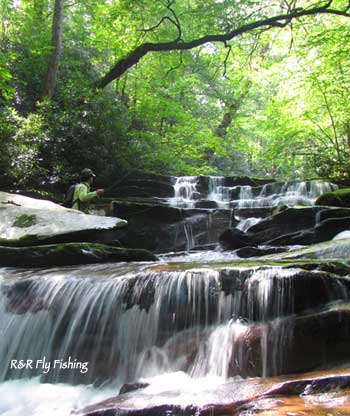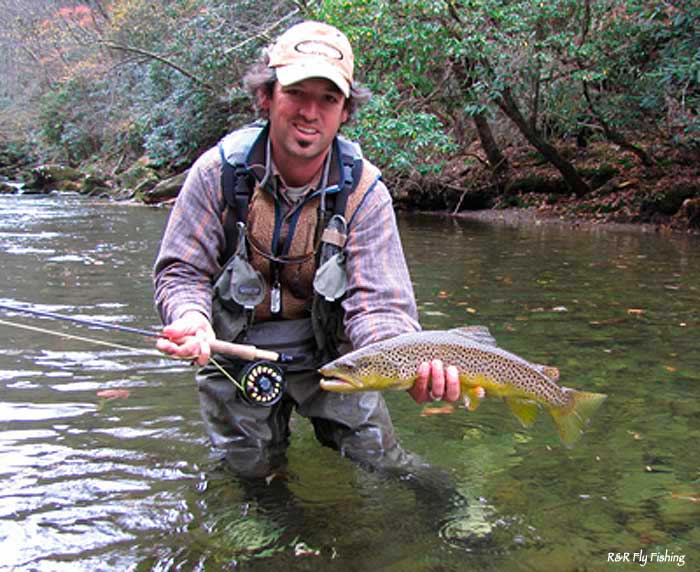If you missed it read Part 1 of Charity and Ian’s interview here.
If you can tell us without breaking a sacred promise or revealing too many secrets, where do you head to fish on a day off?
Ian: It depends on the time of year. There’s so many different types of water nearby we rarely do the same “full day off” trip twice in a season. We usually fish the big streams or float the tailwaters in the spring so we’re on the best dry fly action. In the summer we either hike into remote brook trout streams or float for smallmouth bass. Come fall we’re usually looking for big brown trout in the creeks. In the winter we do a ton of afternoon outings on our local streams.
Charity: Since the Great Smoky Mountains National Park is in our backyard, we often spend an afternoon fishing along any number of streams in the park. We love to hike in on a pretty day. There are just so many options. Fishing streamers is my first choice if we’re floating, even if there is a hatch. I’m a little bit of a streamer fishing addict!
Frankly I’m amazed at the number and diversity of hatches you see in your neighborhood. Which is your favorite one to fish? (I know, this is really an unfair/stupid question to ask….)
Ian: Mmmm, mmm, mmmm…. Do we have to pick just one? I’ll have to say the Quill Gordon hatch in the Smokies takes the number one spot because it’s a big bug that drives the trout crazy. Every year we’ll catch a 16”-18” fish on a dry fly during this hatch which doesn’t sound like much to some people, but in the world of wild, freestone, Eastern trout that’s a big deal.
Yellow Sallies in the Smokies are fun too. It doesn’t happen long in the evening and most people have already gone home, but for about 30 minutes it’s crazy while the stoneflies are laying eggs.
There are also Sulphur and caddis hatches on the tailwaters that are nothing short of phenomenal. Sometimes there are days when the fish are rising everywhere, you’re into fish for hours, and then you look around and realize you haven’t moved 200 yards all afternoon and you have miles to reach the boat ramp. This is a different world from the mountains too, and you can count on big fish up rising to little bugs.
Charity: Ditto.
What are some of the best kept secrets about fly fishing in the Smokies?
Ian: There is so much water! There’s about 800 miles of trout streams just inside the park. Granted, you must have an appreciation for creeks, but it’s a seemingly endless amount of water, and plenty of them are reasonably large. Seriously, I can think of three streams only minutes from my house that I can barely remember the last time I fished them because we have so much water all around. Also, there’s a common misconception that all the water is extremely tight and nothing could be further from the truth. Most of the best streams have plenty of casting room.
Another thing I absolutely love is the fact I can fish big tailwater rivers and smallmouth without having to put in much travel time.
Charity: Fishing is good here just about year round. You can usually find a creek or tailwater with good fishing any day of the year. We have an open season all year and it’s pretty rare that it’s too cold to fish. I’ve learned over the years that a lot of people across the US are freezing in March while we are out in the river every day catching trout on dry fly. We have such a great climate here, it allows us so many options.
We couldn’t help but notice that you come out to our neighborhood every year; what do enjoy most about the Greater Yellowstone area?
Ian: For me it’s primarily a change of scenery. The Western landscape is so different because there is so much in the way of flat terrain and open views compared to where we are. Our rivers and streams are in deep, forested valleys so the feel is completely different. We have pretty country, but it’s completely different. The wildlife in Yellowstone is also easier to see than here in the Smokies. We have the highest density of black bears in the United States, but only get fleeting glimpses of most wildlife because of the dense cover.
Charity: For me the wildlife is the primary draw. I love floating or wading down the river and having to stop to watch a big moose cross the river! We just don’t have moose and bison here and they are huge, beautiful animals. Fishing in the western parts of the US also gives us an opportunity to spend time with other people in the fly fishing industry with a totally different outlook. It never fails that when we have conversations over drinks with Western guides there’s always a “grass is always greener” somewhere else thing going on. We love the fact that western trout are generally bigger and easier to catch – always a plus for a guide. A lot of the guides we meet out west can’t get over the fact we have a 9 month guide season and have the added diversity of smallmouth bass.
Some folks might call you crazy in today’s economic environment for working in the fly fishing arena. What advice would you give a talented young guide with big dreams these days?
Ian: In my experience the biggest challenges in guiding have nothing to do with fishing. It’s all about customer relations, promotion, and money management. My first piece of advice is not to let money burn a hole in your pocket. You’ve got to be able make a paycheck last, particularly when you move into the off season. You can catch more fish than anybody else in the world, be the best casting instructor, and most personable individual out there but you won’t last if your vehicle gets repossessed and your home is in foreclosure.
That’s not the advice any aspiring guide wants to hear, but that’s the fact. Any guide who has been in the business full time for more than two or three years without a trust fund has a lot more on the ball than just fishing smarts.
Charity: Yep, we’re crazy. No argument there. Just be happy doing what you do for a living and make sure that’s the priority.
If you could encourage fly fishers to do just one thing in terms of stewardship this next year, what would that be?
Ian: I would encourage everyone to spend a day working with fisheries biologists in some way. I try to spend a few days every year working with biologists in Great Smoky Mountains National Park. It’s shocking to me how many anglers think they know everything about fish when all they do is go fishing. Seriously, most anglers can’t name more than one or two non-game fish species in their local waters, but their welfare and populations are directly linked to gamefish.
Spend a few days with someone who has a formal education in fisheries and spends their time on the river in a completely different capacity and I guarantee you’ll learn something new and have a renewed outlook on issues that effect fisheries. This makes you a better advocate for rivers and streams you love plus it makes you a better angler.
Charity: We love spending time with the fisheries biologists in the Great Smoky Mountains National Park and have spent a lot of time working on the brook trout restoration projects. We love to do it because we love the area and it really gives us that “Proud Parent” feel when we can take anglers to fish a stream we helped restore. Trout Unlimited does a great job of putting together programs across the country. Find one in your part of the world and make it yours by getting involved.
I also would recommend any kind of project that helps get people outside. I spend lots of volunteer time with Casting For Recovery and I just love introducing women to the sport of fly fishing and just getting them out in the river in waders is always an exciting moment! There are so many great programs out there. If you have the ability to help someone get out in the river whether it’s a breast cancer survivor, a war veteran or a child, it’s a really fun way to share your passions and possibly change someone’s life.
Many thanks to Charity and Ian for taking the time to plow through these interview questions; I’m headed out that way next fall and need to drop in and fish with you guys. Yell next time you’re headed out our way.


